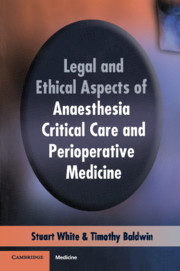Book contents
- Frontmatter
- Contents
- 1 Introduction
- 2 An introduction to the UK legal system
- 3 An introduction to medical ethics
- 4 Rights, and the Human Rights Act, 1998
- 5 Consent
- 6 Negligence
- 7 Confidentiality, and access to medical records
- 8 Abortion
- 9 Products liability
- 10 Research
- 11 Death and organ procurement
- 12 Professional regulation
- 13 Resource allocation
- Appendix: Important legal cases
- Index
5 - Consent
Published online by Cambridge University Press: 18 August 2009
- Frontmatter
- Contents
- 1 Introduction
- 2 An introduction to the UK legal system
- 3 An introduction to medical ethics
- 4 Rights, and the Human Rights Act, 1998
- 5 Consent
- 6 Negligence
- 7 Confidentiality, and access to medical records
- 8 Abortion
- 9 Products liability
- 10 Research
- 11 Death and organ procurement
- 12 Professional regulation
- 13 Resource allocation
- Appendix: Important legal cases
- Index
Summary
Obtaining consent from a patient is not the same as having the patient sign a consent form. Instead, consent should be viewed as a legal and ethical concept that reflects the respect given by a society towards the autonomy of its citizens.
In a medical setting, consent allows an autonomous patient (i.e. one who has the capacity to think, decide and act on the basis of such thought, independently and without hindrance) to define and protect his or her own interests and to control bodily privacy. In law, consent is a device that protects the autonomy of a patient from interference by another party. Any doctor, for example, may be liable in battery or assault if (s)he administers a treatment to a patient without obtaining valid consent from them. Legal sanctions, including awards of damages, injunctions and (in extreme cases) imprisonment are employed to ensure that patient autonomy is respected.
Recourse to the law, however, does not necessarily address the thornier moral problem of why doctors should respect their patients' autonomy, and why they should respect it in preference to other principles that influence the relationship (such as paternalism). Nevertheless, respect for autonomy has become a central pillar of contemporary medical law and ethics, and has resulted in a greater emphasis on patient-centred determination of treatment strategies.
ETHICS
Autonomy
Many authors have attempted to provide an all-encompassing definition of autonomy (Greek: autos – ‘self ’, nomos – ‘rule’).
- Type
- Chapter
- Information
- Publisher: Cambridge University PressPrint publication year: 2004
- 3
- Cited by

